On September 17, the Biden administration unveiled a new sanctions regime that in the coming weeks could be applied to a wide set of warring parties in Ethiopia. Its design and the diplomacy surrounding it are exemplars of a constructive U.S. engagement amidst an intensifying war and awful humanitarian situation.
Yet there should not be high hopes that the sanctions regime will dissuade the warring parties from persisting in their dangerous course.
Intensifying war, worsening famine
Since November 2020, the government of Ethiopia has been at war with the political leadership of the Tigray ethnic minority — the Tigray People’s Liberation Front (TPLF) — which previously dominated the country’s leadership and has been at odds with Prime Minister Abiy Ahmed’s policies. Despite early successes of the Ethiopian National Defense Force (ENDF) — supported by Eritrea, the TPLF’s longtime enemy — the Tigray insurgency routed the ENDF in parts of the northern Tigray region in spring 2021.
Tigray forces also took over parts of the Amhara region, seeing the occupation as leverage against their Ethiopian rivals and Eritrea, which now occupies western Tigray (a region claimed by the Amhara). Tigray forces also pushed into the Afar region to establish a strategic corridor into Djibouti to alleviate Addis Ababa’s chokehold on Tigray, where electricity, internet, banking, and basic food and medical access have been down since November. But while TPLF forces remain in Afar, they have failed to secure the corridor. The TPLF’s push toward Bahir Dar, Amhara’s capital, was also repelled by ENDF and its allies.
In a move fraught with the possibility of setting off a larger civil war, Prime Minister Abiy escalated, calling for the formation of anti-TPLF militias across Ethiopia. Ethiopia’s instability also has potentially-dire destabilizing impacts on the entire Horn of Africa, particularly Somalia, and the Red Sea region.
The now stalled war has featured atrocities against local populations and Eritrean refugees in Tigray perpetrated by the ENDF, Eritrean, and Tigray forces, as well as local militias.
Tigray’s humanitarian crisis is becoming more catastrophic daily. For months, 5.2 million of Tigray’s population of 6 million has faced hunger and required food assistance.
Yet a blockade by Addis Ababa and insurgent and militia attacks have hampered aid deliveries. Since June 28, only 10% of supplies have reached Tigray. The Ethiopian government continues to deny access to Doctors Without Borders and the Norwegian Refugee Council, accusing them of “arming” the TPLF, and has initiated legal cases against other humanitarian NGOs. Worst yet, in response to United Nations criticism of the “man-made” humanitarian catastrophe, the Ethiopian government expelled senior U.N. officials leading humanitarian efforts. The humanitarian situation has also worsened in Afar and Amhara areas under TPLF control.
The new U.S. sanctions regime
Averting an escalating civil war and its regional spillovers and reversing the humanitarian crisis in the Tigray region have been crucial priorities of the Biden administration. U.S. diplomats have spent months probing and prodding both Abiy and the TPLF in proximity talks toward a negotiated ceasefire. However, the so-called “humanitarian ceasefire” that Abiy declared in June, after the ENDF was routed in Tigray, has been anything but humanitarian.
U.S. officials have also engaged extensively with European partners; Gulf countries including the United Arab Emirates, which has a close relationship with Abiy; Turkey; and various African leaders, including the African Union’s special envoy, former Nigerian President Olusegun Obasanjo. Yet despite the exemplary diplomacy, all the signs through August were that both the emboldened TPLF and Abiy remained entrenched in their belligerent, uncompromising, and human-rights-violating policies — prompting my argument that tough love from Washington may have to be applied to the Ethiopian government, the TPLF, Eritrea, and others to at least attempt conflict de-escalation.
On September 18, the U.S. government announced such a tough love policy — involving new sanctions to be applied to the above actors in coming weeks unless they allow unfettered humanitarian access and begin a dialogue to end the conflict.
The praiseworthy design of the sanctions regime avoids typical pitfalls. In the first place, it gives legal exceptions for humanitarian relief delivery. This important proviso learns from the mistakes of the Obama administration whose preoccupation with depriving terrorist groups (in this case, al-Shabab) of material and financial support scared off humanitarian NGOs from delivering food during Somalia’s 2011 famine, contributing to tens of thousands of deaths.
Second, the administration recognized that sanctions are like glue — once they are squeezed out of the policy tube, they are hard to retract. So while they are ready, the sanctions have not yet been applied to any individual on any side of the conflict. The government of Ethiopia, the TPLF, Eritrea, and the Amhara region’s leadership have been given a few weeks’ grace to allow humanitarian access and begin a conflict-mitigation dialogue. This implementation delay takes into account Prime Minister Abiy’s plan to announce his new cabinet in early October. The new cabinet and a strong June 2021 electoral mandate give Abiy some political space to start de-escalating the civil war, though they could also embolden him to double down on militaristic policies.
Further tools at the ready, but difficulties ahead
The prime minister, his constituencies, and the TPLF all still believe in the self-righteousness of their demands and hope to militarily wear out their opponents. Thus, the Biden administration should at least privately communicate a concrete deadline to the sanctions grace period. It also should stress that sanctions can be applied subsequently if the negotiations are purposefully stalled by any party. Even under the best of circumstances, negotiations won’t be easy or fast.
Another possible sanction is on the horizon before November 1: whether or not to extend Ethiopia’s eligibility for duty-free imports allowed under the U.S. African Growth and Opportunity Act (AGOA). AGOA brings Ethiopia about $100 million in hard cash annually and, more importantly, directly generates employment for about 100,000 people, mostly women in southern Ethiopia working in textile factories that export to the United States. AGOA certification is statutorily linked to human rights compliance, requiring that the existing gross human rights violations in the Tigray conflict cease.
The big question is whether Russia, China, and even Turkey will try to undercut the threat of U.S. sanctions. Turkey continues to expand its diplomatic and economic ambitions in the Horn, having offered to mediate disputes between Ethiopia and Sudan over refugees and the fertile agricultural land of al-Fashaga (mostly in Sudan, but claimed by Ethiopia), both issues exacerbated by the Tigray conflict, as well as Ethiopia’s filling up of the Great Ethiopian Renaissance Dam on the Nile. Ankara has stated its support for a peaceful resolution of the Tigray conflict, but may be giving Abiy a sense, whether inadvertently or purposefully, that he can shop among international actors to reduce U.S. and European pressure.
Russia may well be tempted to insert itself into yet another area where it can damage U.S. objectives, irrespective of their substance. Russia’s policy across Africa — and in some other places — has been to subvert U.S. efforts simply by opposing them. And in Ethiopia, Russia may be tempted to attempt to “reclaim” its 1970s Cold War ally.
China has equities in Ethiopia as well: It considers access to the Red Sea a strategic priority and should not want to see the situation in Ethiopia blow up into a complex and long-lasting civil war that would undermine its basic Horn policy, including its maintenance of a military base in Djibouti. China’s financial exposure in Ethiopia also makes it want stability in Ethiopia. But there are complexities. China made substantial economic investments in Ethiopia during the pre-Abiy Ethiopian People’s Revolutionary Democratic Front (EPRDF) regime dominated by the TPLF. That regime’s land expropriation in the Oromia region for decade-long agricultural leases to Chinese and Gulf companies exacerbated ethnic Oromo anti-EPRDF protests and helped bring the regime down. True democracy and accountability in Ethiopia could mean a review and revocation of many of those shady sweetheart deals, and China may prefer to cultivate political clients instead of neutrally seeking to deescalate the conflict. The direction and degree of China’s involvement in Ethiopia thus remain unclear.
Beyond the need for Washington to restore credibility and positive relations with European partners overall, strong engagement with them on Ethiopia could help counter the above risks. Many European countries have strong interests in Africa, yet have been divided on Ethiopia and not established levers such as a sanctions regime.
The Ethiopian government currently feels alienated from Washington and is eager to find new external sponsors. Unfortunately, Addis Ababa sees the relationship in binary terms. Yet for years, the United States erred in coddling the EPRDF regime, ignoring its authoritarianism and human rights abuses at home and in Somalia for the sake of counterterrorism efforts in the Horn of Africa. By being able to deliver tough love to Addis and the TPLF, U.S. policy has matured in the right direction. If the belligerency does de-escalate, a broader civil war is averted, and conflict resolution mechanisms are adopted, the U.S. and Ethiopia should be able to return to strong cooperation.
The Brookings Institution is committed to quality, independence, and impact.
We are supported by a diverse array of funders. In line with our values and policies, each Brookings publication represents the sole views of its author(s).


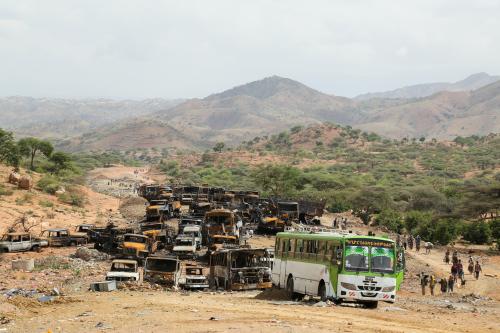
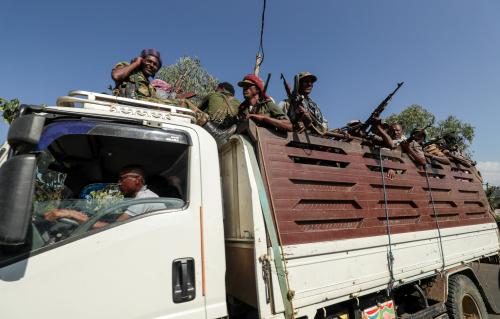
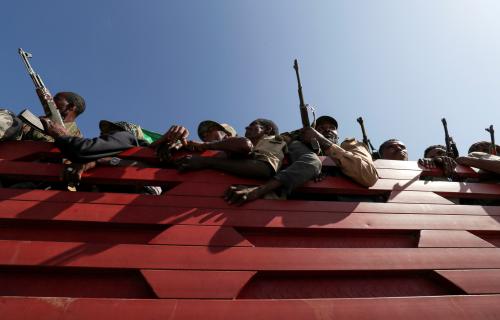

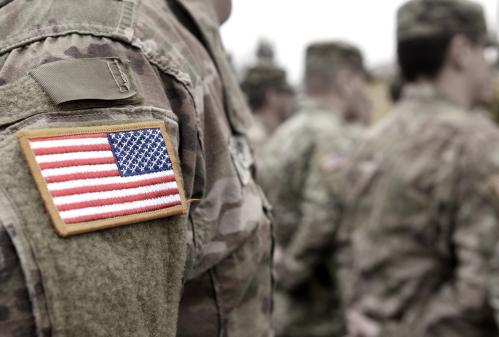
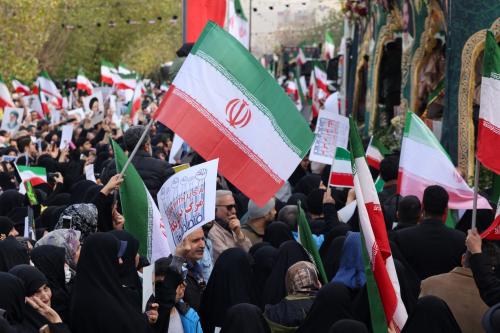
Commentary
The exemplary U.S. sanctions regime for Ethiopia’s Tigray conflict and its limitations
October 1, 2021